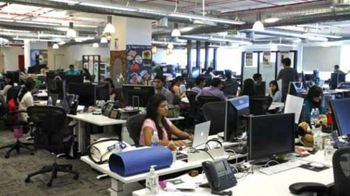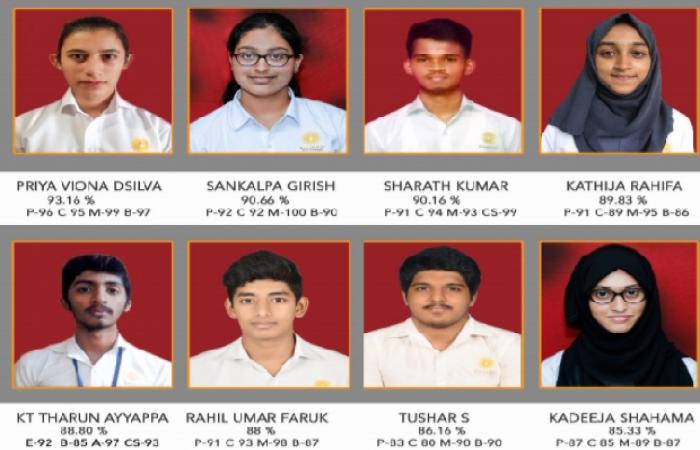Mangaluru, Mar 18: Master of Computer Applications (MCA) programme which was started as a 3 years programme at St Aloysius College in 1999 has become 2 years programme from the academic year 2020-21.
The All India Council for Technical Education (AICTE) in its new guidelines has recommended the duration of the programme to 2 years. This was the long term desire of hundreds of students who wanted to pursue their higher education in Computer Applications / Information Technology domain. The new guidelines will come in effect from the new academic year 2020-21 and has given an add on advantage to the current final year BCA, BSc and other discipline students who would like to pursue their MCA studies.
St Aloysius College (Autonomous), Mangaluru has a rich tradition of training the leaders from 140 years, with NAAC A grade 3.62; the MCA programme being the first post-graduate programme of St Aloysius College, has a history of 21 years training hundreds of professionals to the IT Industry. Since 2007 the college has been granted the Autonomous status, which enables the college to update the curriculum as per the need and the requirements of the IT Industry and several such revisions were done in the past. After the AICTE’s announcement of 2 years of MCA it’s the first college in the state to release the new curriculum with the inputs from Industry-Academia-Research-Innovation teams India and abroad.
Features of the AIMIT MCA
· Complete Choice based credit system programme where the students can select the subjects of his / her choice
· The syllabus is up to date with the latest trends such as Cloud Computing, Edge Computing, Mobile Application Development, Data Science and Big Data Analytics, Artificial Intelligence, Machine Learning & Deep Learning, Internet of Things, Augmented and Virtual Reality etc.
· It has enhanced its technology based applications such as Android, React, Python, Node.js, Angular.js, .NET core, ios- Swift, Etherium, Hadoop, Map Reduce, Scala, Spark, Tableau.
· Mentoring and Coaching of Entrepreneurship / Startups through a Foundations of Entrepreneurship and Advanced Entrepreneurship courses from National Entrepreneurship Network- Wadhwani Foundation
· Experience and motivated faculty members to guide / mentor the Teaching, Learning and Research / Innovation at the Dept
· Certificationsunder the Industry-Academia collaboration – From Salesforce, Mulesoft, IBM, vmware, The Hindu STEP, Amazon AWS certification, Dell-EMC Support in Cloud and Big Data
· Infosys supported InfyTQ, Tata Consultancy Services (TCS) Analytics support
· Institute Innovation Council (IIC) supported activities to enhance the innovation initiatives.
· Use of blended classroom approach – i.e the Mix of Lecture – Tutorial – Video Lectures – Demos – Video Conference Lectures – Invited address by the Expert
· Mini Projects with technologies will create interest and enthusiasm to solve the real time problem
· Laboratory facilities / Library facility with Books both Hard copies and Digital Library support
· Motivation and support to the interested students to participate and present papers in the National and International Conferences / Seminars and participation in various workshops.
· Support and Motivation to participate in various Inter Colligate Fests, Competitions, Hackathones,
· Encourages students to participate in various Sports events at the University / State / national levels.
Benefits of the AIMIT MCA
· The MCA programme enable a person with completely Industry ready technologies and skills essential to the current market requirements.
· The programme has a great demand for getting good jobs in India and abroad as its focusing on latest technologies, it can easily bridge the gap for the requirements of new talents in the Industry.
· Along with technology, MCA programme will motivate the candidate to work on his personality skills and communication skills.
· Final semester is completely dedicated to the Industry Internship / Project work which will give an opportunity for the candidates to work closely with the Industry.
· The candidate will be ready to take up an idea and to go for a startup of his own.E-Summit and Entrepreneurship Development programmes will give an opportunity to interact with various successful Entrepreneurs from various industries
· The student is getting trained as a Leader through hosting several events internally at the Dept such as EpITome- national Level IT and Engineering Fest; SACAIM – International Conference on Advanced IT, Engineering and Management; Infovision – IT Exhibition; Workshop and Seminars; Cultural events at the Dept.
· The Industry Visits will give an exposure to the candidate to understand the various roles, responsibilities and opportunities in the relevant field.
· Opportunity to work on Business Consultancy projects (BCP) make the person more practical and strong in problem solving and map the business requirements with the systems developed.
· Industry-Academia Interface classes by the Project managers of a company specially on Functional Programming is an add on advantage to work on these technologies practically
Placements opportunities for AIMIT MCA
The institute has a strong track record of placements, as it has given the placements to hundreds of students every year to join the IT Companies as Software Developer, Quality Analyst, Delivery Specialists, System Engineer, Database administrator, Mobile App Developer, Web Developer, Data Scientist, Big Data Analytics Specialist, Machine Learning Professional, etc. Its alumni strength itself is a greatest advantage, “Connecting Dots with the Alumni” is a programme at the Department which will connect the present students with the alumni to discuss on various technologies.
Placements from leading companies such as – UniCourt, JDA, Tech Jini, Maventic, BOSCH, Amazon, TCS, CRISIL, ITC Infotech, DXC Technology, IBM, Mtric Stream, MResults, Atalantic Data Services, Salesforce, Mulesoft, Yokagawa, Open Text, Impetus, Riskonect and others.
Eligibility Criteria :
As per AICTE the eligibility criteria for the 2 years of MCA is as follows :
Passed BCA/ Bachelor Degree in Computer Science /Engineering or equivalent Degree.
OR
Passed B.Sc./ B.Com./ B.A. with Mathematics at 10+2 Level or at Graduation Level (with additional bridge Courses as per the norms of the concerned University).
Obtained at least 50% marks (45% marks in case ofcandidates belonging to reserved category) in the Qualifying Examination.
For Admissions to contact:
School of Information Technology
St Aloysius College (Autonomous)
Beeri Campus, Kotekar post
Mangalore 575022
DK, Karnataka
Call : 0824-2286881 / 9141201855
Email : [email protected]
Website :www.aimit.edu.in





 According to Korn Ferry Hay Group 2017 Salary Forecast, India salary growth is pegged at 10 per cent, while real wages are expected to rise by 4.8 per cent.
According to Korn Ferry Hay Group 2017 Salary Forecast, India salary growth is pegged at 10 per cent, while real wages are expected to rise by 4.8 per cent.





Comments
Add new comment